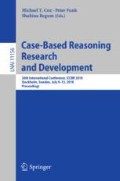Abstract
It is assumed that preferences between two items, described in terms of criteria values belonging to a finite scale, are known for a limited number of pairs of items, which constitutes a case base. The problem is then to predict the preference between the items of a new pair. A new approach based on analogical proportions is presented. Analogical proportions are statements of the form “a is to b as c is to d”. If the change between item-1 and item-2 is the same as the change between item-3 and item-4, and a similar statement holds for item’-1, item’-2, item’-3, item’-4, then one may plausibly assume that the preference between item-1 and item’-1 is to the preference between item-2 and item’-2 as the preference between item-3 and item’-3 is to the preference between item-4 and item’-4. This offers a basis for a plausible prediction of the fourth preference if the three others are known. This approach fits well with the postulates underlying weighted averages. Two algorithms are proposed that look for triples of preferences appropriate for a prediction. The first one only exploits the given set of examples. The second one completes this set with new preferences deducible from this set under a monotony assumption. This completion is limited to the generation of preferences that are useful for the requested prediction. The predicted preferences should fit with the assumption that known preferences agree with a unique unknown weighted average. The reported experiments suggest the effectiveness of the proposed approach.
Access this chapter
Tax calculation will be finalised at checkout
Purchases are for personal use only
Notes
- 1.
During the time we were finalizing this paper, we become aware of a very recent work [8], also aiming at predicting preferences on an analogical basis. Their approach exploits what is called “the horizontal reading” in [17], while here we investigate “the vertical reading” (also introduced in [17]). Moreover the focus of [8] is on learning to rank evaluated with a loss function, which is slightly different from the one here on predicting preferences and computing the error rate of predictions. A detailed comparison of the relative merits of the two approaches are beyond the scope of this paper, but will be the topic of a forthcoming study.
- 2.
References
Aamodt, A., Plaza, E.: Case-based reasoning; foundational issues, methodological variations, and system approaches. AICom 7(1), 39–59 (1994)
Abdel-Aziz, A., Hüllermeier, E.: Case base maintenance in preference-based CBR. In: Hüllermeier, E., Minor, M. (eds.) ICCBR 2015. LNCS (LNAI), vol. 9343, pp. 1–14. Springer, Cham (2015). https://doi.org/10.1007/978-3-319-24586-7_1
Bayoudh, S., Miclet, L., Delhay, A.: Learning by analogy: A classification rule for binary and nominal data. In: Proceedings International Joint Conference on Artificial Intelligence IJCAI07, pp. 678–683 (2007)
Bounhas, M., Prade, H., Richard, G.: Analogy-based classifiers for nominal or numerical data. Int. J. Approx. Reason. 91, 36–55 (2017)
Chen, S., Joachims, T.: Predicting matchups and preferences in context. In: Proceedings of the 22nd ACM SIGKDD International Conference on Knowledge Discovery and Data Mining, KDD 2016, pp. 775–784. ACM, New York (2016)
Couceiro, M., Hug, N., Prade, H., Richard, G.: Analogy-preserving functions: a way to extend boolean samples. In: Proceedings 26th International Joint Conference on Artificial Intelligence, IJCAI 2017, Melbourne, Australia, 19–25 August 2017, pp. 1575–1581 (2017)
Domshlak, C., Hüllermeier, E., Kaci, S., Prade, H.: Preferences in AI: an overview. Artif. Intell. 175(7–8), 1037–1052 (2011)
Fahandar, M.A., Hüllermeier, E.: Learning to rank based on analogical reasoning. In: Proceedings 32th National Conference on Artificial Intelligence (AAAI 2018), New Orleans, 2–7 February 2018
Fürnkranz, J., Hüllermeier, E. (eds.): Preference Learning. Springer, Heidelberg (2010). https://doi.org/10.1007/978-3-642-14125-6
Fürnkranz, J., Hüllermeier, E., Rudin, C., Slowinski, R., Sanner, S.: Preference learning (dagstuhl seminar 14101). Dagstuhl Rep. 4(3), 1–27 (2014)
Grabisch, M., Labreuche, C.: A decade of application of the Choquet and Sugeno integrals in multi-criteria decision aid. Annals Oper. Res. 175, 247–286 (2010)
Hüllermeier, E., Fürnkranz, J.: Editorial: preference learning and ranking. Mach. Learn. 93(2–3), 185–189 (2013)
Khachiyan, L., Boros, E., Borys, K., Elbassioni, K., Gurvich, V.: Generating all vertices of a polyhedron is hard. Discret. Comput. Geom. 39(1), 174–190 (2008)
Lepage, Y.: Analogy and formal languages. In: Proceedings FG/MOL 2001, pp. 373–378 (2001). http://www.slt.atr.co.jp/lepage/pdf/dhdryl.pdf.gz
Miclet, L., Bayoudh, S., Delhay, A.: Analogical dissimilarity: definition, algorithms and two experiments in machine learning. JAIR 32, 793–824 (2008)
Miclet, L., Prade, H.: Handling analogical proportions in classical logic and fuzzy logics settings. In: Sossai, C., Chemello, G. (eds.) ECSQARU 2009. LNCS (LNAI), vol. 5590, pp. 638–650. Springer, Heidelberg (2009). https://doi.org/10.1007/978-3-642-02906-6_55
Pirlot, M., Prade, H., Richard, G.: Completing preferences by means of analogical proportions. In: Torra, V., Narukawa, Y., Navarro-Arribas, G., Yañez, C. (eds.) MDAI 2016. LNCS (LNAI), vol. 9880, pp. 135–147. Springer, Cham (2016). https://doi.org/10.1007/978-3-319-45656-0_12
Prade, H., Richard, G.: From analogical proportion to logical proportions. Logica Universalis 7(4), 441–505 (2013)
Rumelhart, D.E., Abrahamson, A.A.: A model for analogical reasoning. Cognitive Psychol. 5, 1–28 (1973)
Stroppa, N., Yvon, F.: Analogical learning and formal proportions: Definitions and methodological issues. Technical report, June 2005
Yvon, F., Stroppa, N., Delhay, A., Miclet, L.: Solving analogical equations on words. Technical report, Ecole Nationale Supérieure des Télécommunications (2004)
Author information
Authors and Affiliations
Corresponding author
Editor information
Editors and Affiliations
Rights and permissions
Copyright information
© 2018 Springer Nature Switzerland AG
About this paper
Cite this paper
Bounhas, M., Pirlot, M., Prade, H. (2018). Predicting Preferences by Means of Analogical Proportions. In: Cox, M., Funk, P., Begum, S. (eds) Case-Based Reasoning Research and Development. ICCBR 2018. Lecture Notes in Computer Science(), vol 11156. Springer, Cham. https://doi.org/10.1007/978-3-030-01081-2_34
Download citation
DOI: https://doi.org/10.1007/978-3-030-01081-2_34
Published:
Publisher Name: Springer, Cham
Print ISBN: 978-3-030-01080-5
Online ISBN: 978-3-030-01081-2
eBook Packages: Computer ScienceComputer Science (R0)

